Robert Plant and The Band of Joy
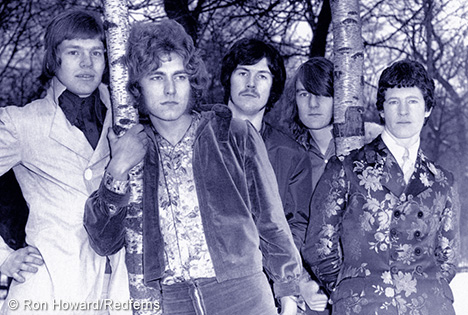
BIRMINGHAM
Updated October, 2022
First line-up April to July 1967
Vernon Pereira lead guitar, vocal
Robert Plant lead vocal, harmonica
Chris Brown organ, vocal
Lyndon Laney bass guitar
Peter Robinson drums
Mickey Cox guitar, vocal
Paul Lockey bass guitar, vocal
Second line-up August to October 1967
Robert Plant vocal, harmonica
Peter Bowen bass guitar
John Elston lead guitar
John Matthews guitar
Steve Taylor drums
Third line-up November 1967 to June 1968
Robert Plant vocal, harmonica
Chris Brown organ, vocal
John Bonham drums
Kevyn Gammond lead guitar, vocal
Paul Lockey bass guitar, vocal
As one of the most significant groups in West Midlands rock music history, "The Band of Joy" have a complex story with changing line-ups, having at one time two versions of the group active at the same time! Formed during the so-called "Summer of Love" in 1967, the band was to include vocalist Robert Plant and drummer John Bonham who both went on to international stardom in Led Zeppelin.
The three "main" line-ups are shown above. It could be said there were four or even five versions of the band, but to avoid confusion, I've tried to simplify things.
"It turned out to be a really good group. It was a combination of what we wrote ourselves, and re-arrangements of things"
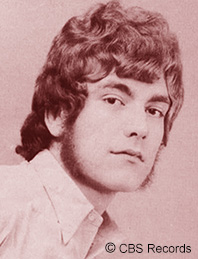
The year 1967 began a new chapter in the life of 18 year old West Bromwich born vocalist Robert Plant. The previous two years with his first professional band called "Listen" (see Listen) was a good learning experience for Robert both on and off the stage. Their only CBS Records single A-side release titled 'You'd Better Run' had missed the record charts and Rob left this mod-styled band when CBS decided to take him on as a solo artist. Unfortunately, his proposed career as a pop singer came to nothing following the release of two failed singles.
The origins of the "Band of Joy" can be traced back to an early 1960s group from West Bromwich called The Stringbeats of whom guitarist Vernon Pereira and keyboard player Chris Brown were members. The Stringbeats were popular locally with a sound and talented multi-racial lineup similar to "The Equals". They were eventually offered a recording contract on Polydor Records but the group fell apart at the prospect of turning "fully professional" and relocating to London.
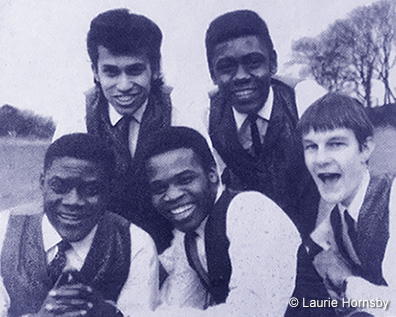
Vernon Pereira (shown top left in the Stringbeats photo) was an immigrant-born neighbour of Robert Plant as they both lived at the time in Trinity Road, West Bromwich. He was actually a cousin of Robert's girlfriend Maureen. Vernon had a good singing voice and enough charisma to front his own band. He was dark, good-looking, and not surprisingly had his own following of female admirers!
Sharing a mutual love of blues and soul music, Robert Plant and Vernon Pereira along with Chris Brown teamed up to form a new group that Rob named "The Band of Joy" with the aim of gigging throughout the West Midlands and beyond. Chris Brown's father known as "Pop" Brown, who had managed The Stringbeats became the band's manager. The other members of this first line-up were drummer Peter Robinson who was previously in a group called "Dante's Inferno", and bass guitarist Lyndon Laney who had played in a band called "The Capitols" and also built guitar amplifiers in his dad's garden shed.
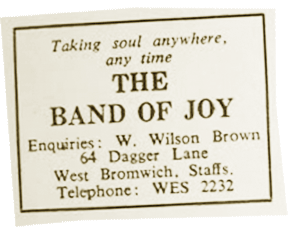
The Band of Joy started rehearsing at a place known as "Holy Joe's" that was located in St. James Church school in nearby Wednesbury. The Reverend Father Joe Husband rented rooms in the building by the hour to local bands and collected the money by calling out "FARES PLEASE". He then went off to the pub and returned around 10:30 pm to make them all leave and lock up. Other bands that went on to use this popular rehearsal spot included The 'N Betweens, Velvett Fogg, and Judas Priest.
Dennis Ashfield was the first roadie for the Band of Joy. Harry Barber who had played drums in local groups "The Shooting Stars" and "The Blues Movement 67" later became their main roadie. He kept a diary of their gigs and is recognized today as a leading authority on this historically significant band.
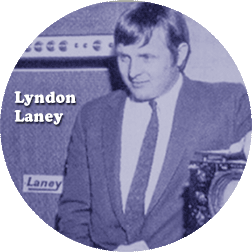
One of the first known gigs for The Band of Joy was at "The Elbow Room" in Aston Birmingham on April 15, 1967 where Steve Winwood's Traffic formed. The group were soon performing throughout the area including Birmingham at "The Carlton" ballroom in Erdington, the "Black Horse" pub in Northfield, and the famous "Cedar Club" on May 3rd in support of Denny Laine's Electric String Band. Lyndon Laney left the band to start his own highly successful "Laney Amplification" company and was replaced by Paul Lockey from The Shooting Stars.
Shown here is the only known photo of the first Band of Joy line-up from early 1967. This picture was originally published in the Wolverhampton Express and Star.
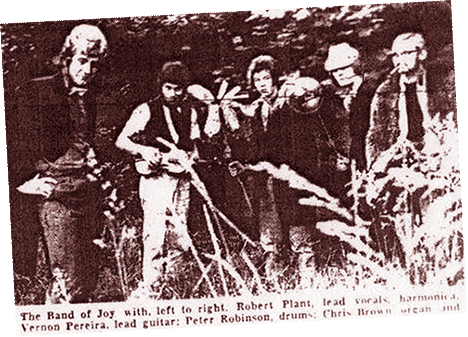
The group played mostly blues and soul covers like 'Midnight Hour' and 'Mustang Sally' along with various Tamla Motown numbers that were popular at the time. Robert Plant was undoubtably the "front man" of the band, singing lead vocal on most songs including Tim Hardin's 'If I Were A Carpenter' although Vernon Pereira also sang a few too.
Harry Barber said; "Each gig started with Daryl Bank's 'Open The Door To Your Heart'. When Robert sang this it made the hairs on the back of your neck stand up." An added benefit was the large number of female admirers attracted by the singers that all the group members happily took advantage of.
The Band of Joy gigged consistently around Birmingham and the West Midlands during the summer of 1967 while their popularity grew. Robert Plant had bought an old Morris Minor car that he used for his personal transport to the shows, sometimes bringing along with him an "entourage" of mostly female fans. He started arriving late for gigs and was usually first to leave after the show, causing resentment among other group members who had to stay longer to pack things up and help load the van.
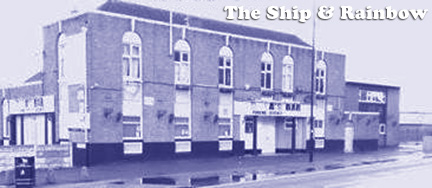
Things came to a head in July 1967 for a gig upstairs at The Ship & Rainbow pub in Walsall. Upon arrival, Robert Plant was told he needed to start helping out more or he would be out of the band. Seemingly unfazed, Robert went on and did the gig as usual until performing the last song after which he announced to the audience in poetic fashion that he would be "leaving" The Band of Joy. He then promptly left, to the dismay of the other group members!
According to Harry Barber's book, Robert Plant did perform a few more times with the Band of Joy line-up following this incident. His last performance with them was at the "Black Horse" pub on the Bristol Road in Northfield, Birmingham on July 29, 1967.
The band had other gigs lined-up and so Mickey Cox (guitar and vocal) from Harry Barber's old band "The Shooting Stars" was quickly recruited. Now the group went on to develop four-part harmonies that increased the number of popular songs they could cover and went down well on stage. The re-formed Band of Joy went on an extensive tour of Scotland in August of 1967 where they were a hit with the audiences.
"Already their disk has hit the Birmingham Top Twenty"
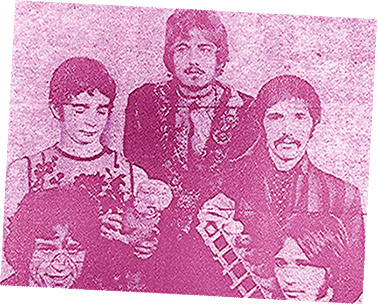
It was soon discovered that another "Band of Joy" fronted by Robert Plant were now active in the West Midlands. Rob had decided the name belonged to him and persuaded a Wolverhampton group called "Paper" to be his new backing band. They were John Elston (lead guitar), Peter Bowen (bass guitar), John Matthews (guitar), and Steve Taylor (drums).
By this time, the so called "Summer of Love" was in full swing and Robert Plant had immersed himself into the American style of "hippie" culture and music, having a somewhat romantic vision of how things were on the west coast in San Francisco where the girls wore flowers in their hair. He was also not unfamiliar with the use of "certain substances" to assist on his path to enlightenment.
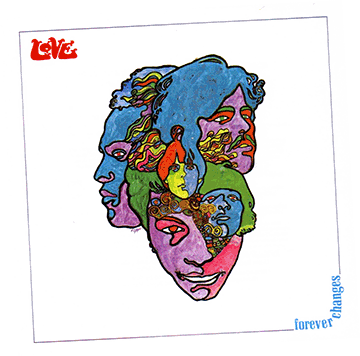
He said; "I got hold of a copy of a Buffalo Springfield album. It was great because it was the kind of music you could leap around to, or you could sit down and just dig it. Then I got the first Moby Grape album which was a knockout. I had loved good blues but I suddenly couldn't listen to old blues any more. Now I was sobbing to Arthur Lee and Love doing 'Forever Changes'."
Along with the new music, Robert Plant's new Band of Joy were prone to appear on stage with brightly painted faces, dressed in robes or kaftans and beads while burning incense and using coloured lights to illuminate their performances. More importantly - and leaving no doubt as to who's group it was - the lineup were advertised as "Robert Plant and The Band of Joy".
Robert Plant recalled; "It frightened everybody to death! This big fat bass player would come running on, wearing a kaftan and bells, and dive straight off the stage and into the audience. I howled so much that I couldn't do anything at all."
They even got a mention in the influential 'New Musical Express' newspaper where it was written; "Now he (Robert Plant) works all over the country with his backing group The Band of Joy. Already their disk has hit the Birmingham Top Twenty which is at least 'planting' the seeds of his talent". The "disk" mentioned is of course Robert's second failed solo single for CBS titled 'Long Time Coming' that actually had nothing to do with The Band of Joy!
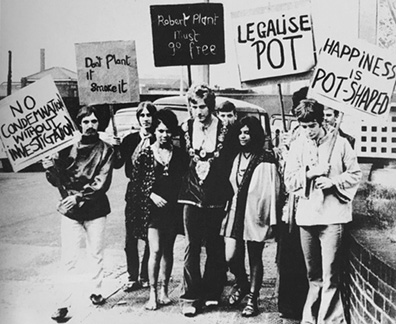
Robert Plant had hooked up again with Mike Dolan who managed his previous group called Listen and helped them get a recording contract. In a plan to gain some free publicity for Robert and his band, Dolan proposed a "legalise pot" march for August 10, 1967 that was reported in the local newspaper. Rob had a scheduled court appearance that day at the Wednesbury court house for a minor traffic offense.
This "protest" attracted only a small group of Robert's friends who carried suitable signs that read "Don't Plant It Smoke It", and "Robert Plant Must Go Free". Dressed in his finest hippie attire, Robert ably defended himself in court and was cleared of the dangerous driving charge against him. When interviewed for the Wolverhampton Express and Star, Mike Dolan denied involvement but sadly, one protester who was a nurse, lost her job over the incident.
With all this publicity, the "original" Band of Joy were having a tough time despite their popularity. Bookers and fans alike were naturally confused by two bands having the same name. Pop Brown decided they had to change and so in October 1967 the line-up became known as "The Good Egg". Unfortunately, they didn't last long as by the end of the year Vernon Pereira had left to join a Birmingham group called The Wellington Kitch Jump Band, and Chris Brown along with Paul Lockey also left to join up again with Robert Plant. Mickey Cox and Harry Barber went on to form a new line-up called Paint.
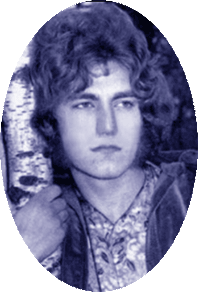
It was Robert Plant's ambition to make a big selling record, and so to this aim he broke up his existing band and not long after, assembled yet another version of The Band of Joy. Possibly the biggest spur was observing some of his friends and contemporaries in groups like The Move and Traffic, storming up the record charts with cutting edge singles while perceiving his own image to be that of a failed "pop" singer.
Some sources claim that bass guitarist Dave Pegg from The Uglys and The Exception was part of the new group, but Dave who went on to join "Fairport Convention" was never in the Band of Joy line-up although he did perform in "The Way of Life" with John Bonham.
Robert Plant brought in former bandmate Chris Brown on keyboard and Paul Lockey on bass guitar. He also persuaded talented guitarist Kevyn Gammond from popular Kidderminster band "The Shakedown Sound" to join them. "Pop" Brown followed his son and was now finding gigs for the Band of Joy again. Drummer Phil Brittle from a Birmingham group called Traction also joined but according to Harry Barber he didn't stay for very long.

The most significant addition to this new line-up was drummer John "Bonzo" Bonham. He came from a struggling Birmingham group called The Way of Life that had almost as many member changes as the Band of Joy! Robert Plant had previously performed with John during his brief time in "The Crawling Kingsnakes".
John's first band was a rock 'n' roll line-up called "Terry Webb and The Spiders" who came from the Stratford-upon-Avon area. He then joined a Birmingham beat group called The Senators and made recordings with them for the DIAL "Brum Beat" album issued in 1964. By this time, John had a reputation as one of the loudest drummers in the West Midlands. His addition completed this most famous and well-known version of The Band of Joy.
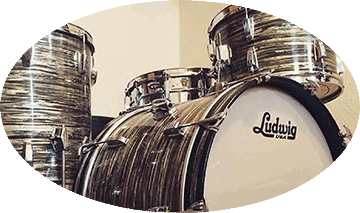
John Bonham had missed out on an opportunity to join the highly successful Birmingham band The Move at the end of 1965 when he turned down the offer and so the job went to Bev Bevan of The Vikings. John had a car but lived 20 miles away from Robert in the town of Redditch and trying to support his wife and young son, could barely afford to buy petrol. Robert Plant conspired to help him out by discretely siphoning gas from parked cars late at night, such was his enthusiasm to have him in the band!
It was a perfect combination. The Band of Joy fronted by Robert Plant's dynamic vocal delivery, along with John Bonham's powerhouse drumming. The other guys in the group were top players and no less essential with Kevyn Gammond dispensing bursts of fast psychedelic guitar solos and Paul Lockey's solid bass holding down the bottom end. Chris Brown contributed the atmospheric backdrop with his Hammond organ - a sound very popular at the time.
Robert Plant said; "It turned out to be a really good group. It was a combination of what we wrote ourselves, which wasn't incredible, and re-arrangements of things." Kevyn Gammond remembered; "You couldn't call what we were doing 'freak rock' but it had that spirit to it. It was exciting and it set us apart from all the twelve-bar stuff that we'd grown up with. A number could go on for ten or fifteen minutes - god help the poor audience!"
"It was seriously loud down there and Robert would drip with sweat"
While all this was going on, Robert Plant alternated between staying with his girlfriend Maureen at her parent's home in West Bromwich, and living with friends at another location in Lye near Stourbridge. This old house at Number One Hill Road was shared by students and was by all accounts in poor repair. Robert used the cellar as band rehearsal space where they set up their equipment.

Andrew Hewkin who was an art school student renting a room there remembered; "People came and went all the time. It was hard to know who was living there and who wasn't because you'd bump into a different girl or guy every morning. We were all paying virtually nothing in rent. It was seriously loud down there in the cellar and Robert would drip with sweat."
Paying gigs of course were a priority but not so easy to find for Robert Plant and his band as most local venues catered to a pop audience and dance crowd. John Ogden who wrote for the Wolverhampton Express and Star also ran a blues club and booked them at Walsall's venerable Ship & Rainbow on November 15, 1967.
He remembered; "It wasn't really a success because most of the audience were blues freaks and Robert wasn't doing that then. I do remember him singing Jefferson Airpane's 'White Rabbit' and it being bloody great. He said afterwards that he was disappointed in the response. He said people ought to listen and he couldn't keep doing the same thing. But back then if you were loud or different you couldn't get gigs around here."

Mike Dolan wasted no time in securing bookings further afield at hip venues in an effort to gain them more exposure. London was the big attraction with its exploding "undergound" scene and so the Band of Joy performed at the famous Marquee and Middle Earth clubs. They also played at the influential Club a'Gogo in Newcastle.
The Band of Joy line-up shown here was taken in January of 1968 by "Top of The Pops" photographer Ron Howard who was famous for his photos of the Beatles, Rolling Stones, Jimi Hendrix, and many others. Pictured in London on the grounds of Holland Park School in Kensington, and shown left to right are; Kevyn Gammond, Robert Plant, John Bonham, Chris Brown, and Paul Lockey.
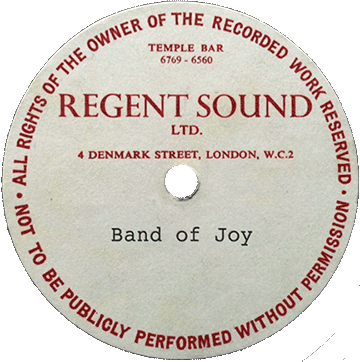
In early 1968, Mike Dolan booked studio time at "Regent Sound" in London where he had the group record some of their songs that he could play to record company people in hopes of getting a contract. Robert Plant and his Band of Joy chose to record their version of Buffalo Springfield's 'For What It's Worth' and the folk/blues classic 'Hey Joe' made famous by The Jimi Hendrix Experience. They also recorded a few original compositions titled 'Adriatic Sea View (Gotta Find My Baby)' and 'Memory Lane'.
As can be imagined, these historic recordings became highly sought after by fans of Led Zeppelin as the first to feature both Robert Plant and John Bonham playing together. While rough, there's no denying the power in these performances that could almost pass for early Led Zeppelin when considering Kevyn Gammond's Jimmy Page-like guitar playing. The tracks were much bootlegged over the years, none of them appearing officially until Robert Plant's album "Sixty Six to Timbuktu" issued in 2003.
"You're not going out with Planty any more, we're starving!"
Harry Barber who was playing drums in his band Paint, also continued to work as roadie for the Band of Joy. He now had his own reliable van but says it was not always easy going between Robert Plant and John Bonham. In March 1968, the band were touring as support for American vocalist and 'Morning Dew' singer Tim Rose.

On a drive up to a gig in Newcastle, Harry remembered; "During the journey, an argument between Bonzo and Robert began. After a while I got fed up with this so pulled over and kicked them both out of the van. When they finally sorted themselves out, everyone got back in and the rest of the journey was uneventful. I hadn't realized before there was friction between John and Robert."
Years later, Robert Plant said; "John would set his drums up at the front of the stage so there was nowhere for me to stand. In the Band of Joy we were penniless. Stealing milk from doorsteps and siphoning gasoline out of cars in the middle of the night. His wife Pat used to say, 'You're not going out with Planty any more, we're starving!"
Despite Mike Dolan's best efforts, he was unable to attract much interest with the London based record companies concerning Robert Plant and the Band of Joy. Mike did get them a residency at the Speakeasy Club but this and other gigs around the West Midlands were barely enough to sustain them.
Members of The Move recommended the Band of Joy to their former manager Tony Secunda who invited the group to an audition in London. Only Robert Plant and Kevyn Gammond could afford train tickets to go down there. After a meeting, they were provided with a hotel room and told to write a song that was recorded the next day with producer Denny Cordell. Secunda wasn't too impressed with the results and following their departure back to Birmingham they never heard from him again.
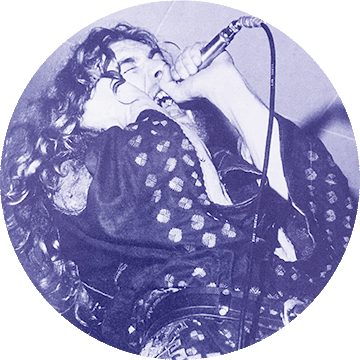
One of the last significant appearances by Robert Plant and the Band of Joy was at the Carlton Club in Erdington, Birmingham where they played twice, on March 8, and April 5 of 1968. Phil Myatt who ran the club said; "The music scene had started to change. We began experimenting by putting on some rock acts at the Carlton, groups like Jethro Tull and The Band of Joy, and eventually decided to rename the club." The Carlton was re-launched as the world famous "Mothers" club later that year.
Disagreements within the group led to Paul Lockey and Kevyn Gammond leaving the band to form another group called "Bronco" who had original Band of Joy member Peter Robinson on drums and future Robert Plant collaborator Robbie Blunt on guitar. Because the Band of Joy still had gig commitments, Robert Plant brought in folk/blues guitarist Mick Strode and bass guitarist John Hill who was a friend of John Bonham. This final short-lived lineup lasted only a few months.
John Hill said; "We did a tour round Scotland and the north in 1968. This was for the infamous Duncan McKinnon "Drunken Duncan", a superb man with a wonderful warm heart. It was right after this that Robert went to London to play with Alexis Korner. This didn't help me and Bonzo at the time as we were about to rehearse a new line-up consisting of John, myself, Reggie and Chrissy Jones and a keyboard player that John found from a Liverpool band - I think they were known as The Peeps."
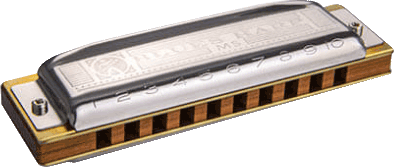
Robert Plant had indeed left for London at the invitation of famous British blues pioneer Alexis Korner who Robert met at a Midlands Art Institute performance in Birmingham's Cannon Hill Park. Sitting in the front row and egged on by his friends, Robert had boldly asked Alexis for an opportunity to get up on stage with his harmonica and perform a number with him. Alexis and his band complied and were suitably impressed by both Robert's performance and his knowledge of the blues.
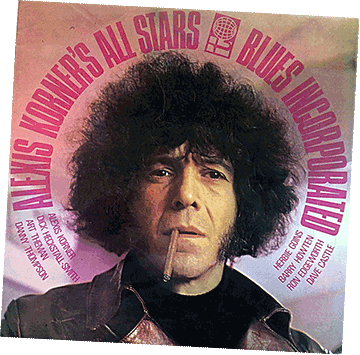
Robert Plant ended up staying with Alexis Korner in London for a while where they played a number of gigs together. Rumour has it that one of their performances had top session player and Yardbirds guitarist Jimmy Page in the audience. They also wrote and recorded a couple of songs titled 'Operator' and 'Steal Away' along with British blues pianist Steve Miller. There was talk of making an album but during this time, Robert returned home to discover his Band of Joy was no more.
The end of The Band of Joy had come suddenly when John Bonham was contacted by Tim Rose who they had toured with and appeared on the same bill at London's Marquee club. Tim's regular drummer Aynsley Dunbar was unavailable and he offered John the job of drummer in his backing band that paid 40 pounds a week - way more than what he was getting in the Band of Joy. Not surprisingly, John Bonham accepted the offer and by the end of June of 1968 he was touring with Tim Rose.
Robert Plant was now just a few months away from his twentieth birthday by which point he had told his girlfriend Maureen he would give up music and find a "proper job" if he hadn't made it by then. What he desperately needed now was another band to back him, and so he found a local group led by keyboardist Bill Bonham who billed themselves as "Obs-Tweedle" !! Click HERE to continue...
"Ramble On"
Chris Brown and John Hill joined the Birmingham group "The Wellington Kitch Jump Band" that included former Band of Joy member Vernon Pereira along with ex 'N Betweens singer John Howells and future Wizzard drummer Charlie Grima. Mick Strode left to live in London where he played and recorded with other well-known musicians and joined a band called "Forever More" under the name Mick Travis. Chris Brown went on to join another Birmingham band called "Life" and later performed occasionally with his old band mate Vernon Pereira in "The Possessed".
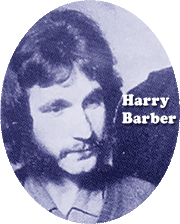
Band of Joy roadie Harry Barber continued to perform as drummer for the group Paint with original Band of Joy guitarist Mickey Cox. The group's name was later changed to "Jardine" and they recorded an album that had contributions from Peter Frampton and Andy Bown of The Herd. Harry continued to play drums with other bands and work as a roadie until the later 1970s. He went to live in Wales where he volunteered at the Llangollen Steam Railway, eventually becoming an employee there. In 2010, following years of research and assistance from his wife Roz, he published the first book written on The Band of Joy (see the link below).
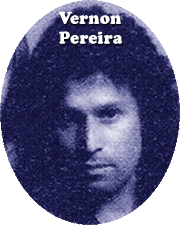
Band of Joy founding member Vernon Pereira went on to form a locally popular band called "The Possessed" who toured up and down the UK during the 1970s. Paul Lockey played on some of their recordings. They were widely believed to be on the verge of major success with a big label recording contract. In the early morning of October 25, 1976 while driving home in their van from a gig in Carlisle, they collided with a truck and Vernon was killed at age 32 along with two other group members. Four years later in sad coincidence, John Bonham also died at 32 although under entirely different circumstances.
In 1978, Paul Lockey and Kevyn Gammond re-formed the Band of Joy with original drummer Peter Robinson along with new members Michael Chetwood on keyboards and John Pasternak on guitar. They recorded an album for the Polydor label and toured the UK and USA in support of Manfred Mann's Earth Band. Following the recording of another album in 1983, they disbanded and the members went on to join other bands.
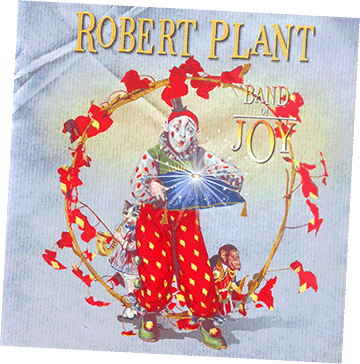
Kevyn Gammond later became a music teacher, and in the late 1990s re-united with Robert Plant and along with a few other local musicians, formed a part-time covers band called "Priory of Brion". They played a number of low-key pub gigs around the West Midlands and travelled to Ireland before committing to larger venues and a short European tour, after which they disbanded at the end of 2000.
In 2010, Robert Plant formed an all-new lineup of the "Band of Joy" with whom he toured the USA and recorded a critically acclaimed album that was nominated for a 2011 Grammy Award.
This page is dedicated to all the talented musicians who played in The Band of Joy, some of whom died tragically young and others who are no longer with us.
Copyright © John R Woodhouse
Sources: 'Robert Plant - A Life' book by Paul Rees 2013; 'The Band of Joy' book by Harry Barber 2010; 'Hammer of The Gods' book by Stephen Davis 1985; 'Rock Record' book by Terry Hounsome and Tim Chambre 1981; 'Brum Rocked On!' book by Laurie Hornsby 2003; 'Ace Kefford interview - Record Collector' magazine July 1994 by Alan Clayson; 'The Led Zeppelin Encyclopedia' book by Malcolm Dome and Jerry Ewing 2010; 'Light & Shade - conversations with Jimmy Page' book by Brad Tolinski 2012; 'Laney Amplification' website (laney.co.uk); plus assistance from John Hill, Keith Law, and John H. Warburg.
See BrumBeat REVIEWS page The Band of Joy Book by Harry Barber. You can also visit Harry's Band of Joy web site at: http://bandofjoy.com
The official web site for Robert Plant is: www.robertplant.com
If you would like to contribute to this page, please e-mail john@brumbeat.net